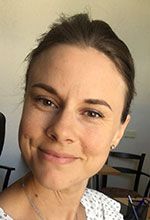Press release -
“We need to enable more internationally educated nurses to exercise their profession here in Sweden”
A new study shows that the complementary programme for nurses from countries outside the EU provides Self-confidence and readiness to work in Sweden. In the last three years, however, relatively few of the applicants, 300 out of 1800, have obtained a Swedish licence.
“Our aim is to find out what we need to do to enable more nurses who have immigrated to work as nurses in Sweden," says Denice Högstedt, researcher in nursing sciences at University of Gävle.
In Sweden, there is a shortage of both nurses with bachelor’s degrees and specialists. At the same time, the number of trained nurses coming to Sweden from other countries has increased.
At University of Gävle, a research project is now underway, aiming to determine factors that can facilitate inclusion in Swedish working life for internationally educated nurses.

“According to a report from the National Board of Health and Welfare, there is a shortage of nurses with bachelor’s degrees in 17 of 21 regions and a shortage of specialist nurses in all of them. At the same time, trained nurses are immigrating to Sweden, and we want to see we can do to enable more of them to exercise to their profession,” says Denice Högstedt.
When the nurse’ qualifications have been approved by the National Board of Health and Welfare, there are two ways to obtain a Swedish nursing license. Either the nurse completes a one-year complementary programme, which for example University of Gävle offers, or the nurse takes a proficiency test at the National Board of Health and Welfare combined with clinical training and a course in Swedish laws and regulations.
Self-confident and prepared after complementary programme
During the programme, the nurses generally experienced that the teachers, supervisors, and other students gave them support, and, after completing the programme, they felt confident and prepared to work in Sweden.
Taking responsibility themselves and becoming fully involved in their training was initially quite challenging, but afterwards the students saw this challenge as an opportunity for in-depth learning.
“It is important to take into account that the nurses may need tailored individual support. They come from different countries, have different levels of experience and their training may differ in different ways from Swedish nursing education,” Denice Högstedt says.
Draw attention to support for the proficiency test
Denice Högstedt believes that available support and information need to be made more visible for those who choose to take the proficiency test and clinical training through the National Board of Health and Welfare.
Nurses who took this path described that they could feel helpless and alone, as it was difficult to find information and support.
“Only one of the nurses I interviewed had found a preparatory course for the proficiency test. Even though here may be quite a lot of support available, they cannot find it. However, when at the test and in clinical training, they too experienced good support.
“They feel joy and pride”
The nurses in the two studies describe that they have learned very much and that they have been able to prove their expertise, both to themselves and to others. They also feel joy and take pride in their success.
“We need to make the most of the skilled individuals who come here; it is important both for Sweden and for the individual. They have trained as nurses and may have worked for many years in their home country and want to be able to exercise their profession,” Denice Högstedt says.
In two new studies, the researchers in Gävle will follow these nurses in their working lives.
-----------
-----------
Link to the study on the complementary programme
Link to the study on the National Board of Health and Welfare's knowledge test
More about the strategic research area Health promotion work at the University of Gävle
----------
----------
Contact:
Denice Högstedt, registered nurse and doctoral student in nursing science at University of Gävle
Phone: 073-670 70 91
E-mail: Denice.Hogstedt@hig.se
Text: Douglas Öhrbom
Photo: TT/Maskot
Photo Denice Högstedt: Privat
Topics
- Health, Health Care, Pharmaceuticals
Categories
- nurses
- nurse shortage
- validation of nurses id
- university of gävle
- specialist nurses
- research
- caring science
- the complementary programme for nurses from countries outside the eu
- denice högstedt
Education and Research at a Scenic Campus.
The University of Gävle has approximately 17 000 students, more than 50 study programmes and second-cycle programmes, about 1 000 courses in humanities, social and natural sciences and technology.
Research Profiles
Built Environment and Health-promoting Working Life are the general research profiles of the higher education institution. Important parts included are Spatial Planning with a specialisation in Sustainable Built Environment and Musculoskeletal Disorders with the purpose to prevent work-related injuries. In 2010, the higher education institution received permission to carry out third-cycle programmes in the profile area of Built Environment.
The higher education institution has applied for permission to carry out third-cycle programmes in technology, humanities and social sciences.
